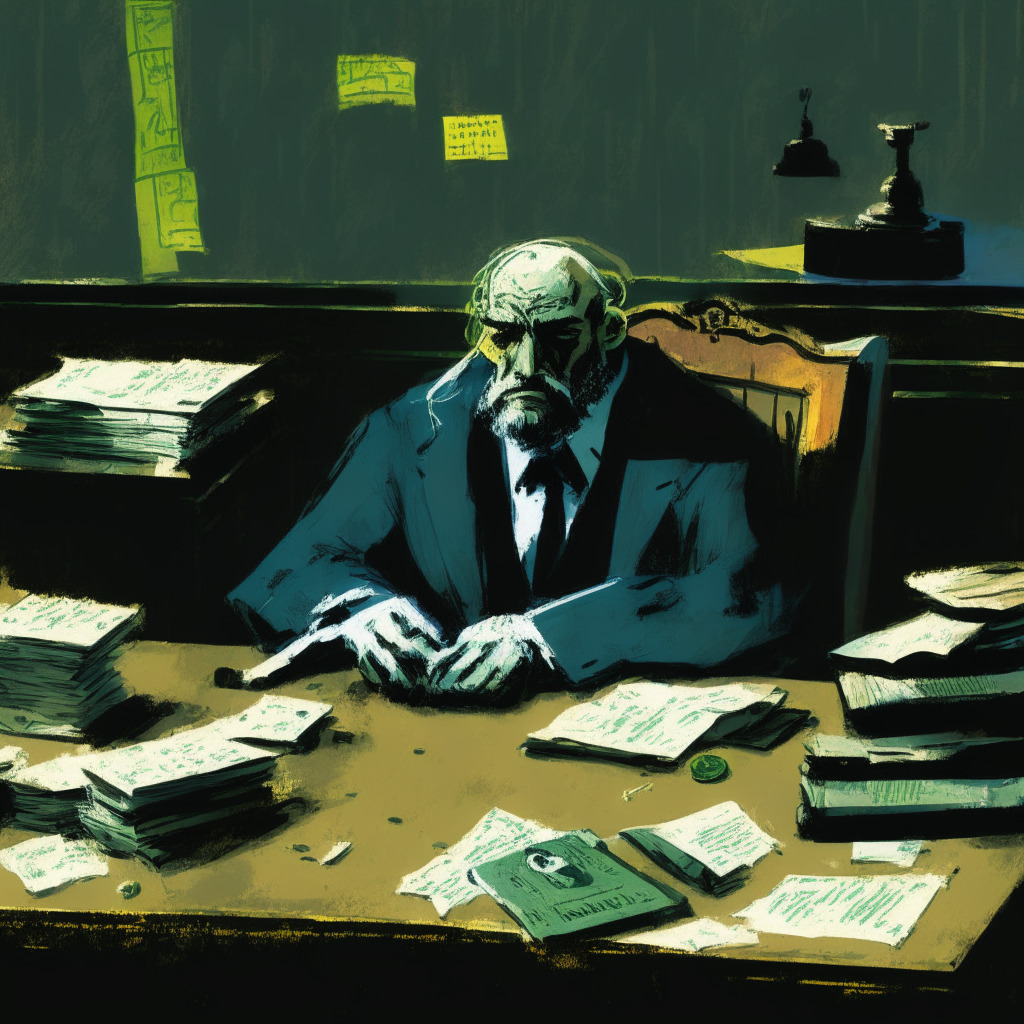Genesis, a crypto lender facing bankruptcy, is being accused by creditors, including Gemini and Digital Currency Group, of manipulating bankruptcy proceedings with their proposed settlement. The settlement, seen by some as giving preferential treatment to certain creditors, includes Alameda Research receiving $175 million from Genesis’s assets. Critics argue it deviates from acceptable Chapter 11 protocol.
Search Results for: Ankr
Controversy Clouds Genesis Global Capital’s Bankruptcy Settlement with FTX
Bankrupt crypto lender, Genesis Global Capital, is under scrutiny regarding its proposed $175 million settlement with FTX, accused of manipulating the bankruptcy process through vote-buying. Genesis’s future, and the recovery of creditors’ funds, now lies in the hands of Bankruptcy Judge Sean Lane.
Gemini Challenges Genesis’ Bankruptcy Resolution – Doubts Over Debt Assurances Roil Crypto Markets
Crypto exchange Gemini objects against Genesis’ bankruptcy resolution proposal, arguing it lacks detail and adequate assurances to major debtors. This comes after Gemini took legal action against DCG for non-payment of debts. Gemini and other creditors demand transparency and effective solutions in this complex bankruptcy case.
Bankruptcy Battle: Gemini and Genesis in a Clash over Resolution Prospects
“Crypto exchange Gemini is contesting Genesis’ proposed bankruptcy resolution, citing lack of specifics and unsatisfactory assurances for key creditors. Gemini, along with the Fair Deal Group and the Ad Hoc Group of Genesis Lenders, questions the plan’s clarity and comprehensiveness, highlighting Genesis’ unsettled debts and its capacity to execute a sustainable plan.”
Genesis Bankruptcy Woes: Gemini’s Doubts and DCG’s Debts Cloud Crypto Markets
The Fair Deal Group and Gemini express skepticism over Genesis’s proposed bankruptcy resolution, citing lack of substantial details and concerns about the company’s ability to implement a feasible plan. The situation calls for greater transparency and stronger financial practices within the crypto markets.
BlockFi Bankruptcy: Proposed Stablecoin Switch for Trade-Only Wallets and Legal Scuffles
Bankrupt crypto lender BlockFi has requested court approval to convert “trade-only” wallet assets into stablecoins for withdrawal. Accounting for less than half a percent of all BlockFi user wallets in the U.S., these include diverse digital currencies such as Bitcoin Cash, Algorand and Dogecoin. BlockFi aims to facilitate a comprehensive withdrawal process through this method.
Insufficiency Claims Surround Genesis’ Bankruptcy Settlement: A Muddled Affair in Crypto Lending
“The proposed settlement agreement on the bankruptcy of cryptocurrency lender, Genesis, has met resistance. Some lenders argue that the agreement, offering 70%-90% recoveries, neglects fiduciary duties to maximize creditor recoveries. Concerns also emerge about non-consensual third-party releases, wherein non-debtor parties are absolved from liability without consensus from all potential claimholders.”
Genesis Global Capital Bankruptcy: Uncertain Future Amid Creditors’ Resistance and DCG’s Proposal
The futurity of the defunct lender Genesis Global Capital (GGC) is under scrutiny due to concerns raised by creditors over a $1 billion debt. A deal by parent company, Digital Currency Group (DCG), to repay the liabilities has been criticized since it potentially allows DCG to evade future obligations. This controversy underscores the unpredictable, high-stakes nature of the crypto lending realm.
Bankruptcy Escape Route for DCG: A Breather or a Necessary Evil for the Crypto Sphere?
“Genesis, a crypto lending firm, filed for bankruptcy due to market conditions causing significant withdrawals. A recent agreement with its creditors, DCG, could see up to 90% recovery for Genesis creditors. The deal involves a settlement of over $1.7 billion in liabilities and introduces new debt facilities and a partial repayment agreement, offering some relief in a challenging market.”
Bankruptcy Judge’s Hesitation on Crypto Tokens as Securities: A Case Study of Celsius
The bankruptcy judge recently declined to classify CEL, Celsius’s native token, as a security amid Ripple Labs and SEC’s ongoing legal issues. CEL’s business model significantly deviated, being referred to as “insolvent since inception” by a court-appointed examiner, who suggested CEL was part of a problematic scheme. The rising token value benefits the company but raises concerns about ethical considerations and customer implications.
The Fall of CEL Tokens: A Tale of Volatility, Valuation and Bankruptcy in Crypto Markets
The attempt to value CEL tokens at $0.80 met an unfortunate end, leading to a proposed wind-up plan at $0.25. Token holders’ plea about maintaining the original value endured the harsh reality of market manipulations. Amid the legal tussles and uncertainties, creditors have a month to cast their votes on the sale plan.
Bankrupt FTX’s $3 Billion Crypto Staking and Hedging: Tackling Debt or Inviting Risk?
Bankrupt crypto exchange FTX, now overseen by restructuring expert John Ray III, plans to initiate staking and hedging sales for its vast $3 billion crypto assets. FTX aims to avoid harming its asset value and intends to pay creditors in fiat currency, instead of bitcoin or ether. This strategy, requiring careful trading and the advisory support of Mike Novogratz’s Galaxy empire, awaits validation from Delaware’s bankruptcy court.
Controversy over FTX Bankrupt Crypto Exchange Settlement Plan: A Clash of Transparency VS Simplicity
The bankrupt crypto exchange FTX’s settlement plan for ‘Small Estate Claims’ met controversy as the Official Committee of Unsecured Creditors expressed dissatisfaction, supported by Andrew R. Vara who found lack of detail and clarity in the plan. Despite FTX’s efforts to address the concerns, this case emphasizes the necessity of stringent regulations to ensure fairness and transparency in blockchain technology’s potential for simplified claim settlements.
Bankruptcy Woes of Cryptocurrency Giant FTX: A Clash Between Debt Settlement and Due Diligence
The cryptocurrency arena’s turbulence, exemplified by FTX’s bankruptcy, illuminates the complexities of digital asset exchange regulations. FTX is striving to resolve their debt issue. Meanwhile, the U.S. Trustee questions the settlement motion and deems $10 million as an excessive “small” claim. These events underpin the intricacies governing future cryptocurrency development and exchanges.
Bankruptcy Recuperation: Celsius Lender’s $2 Billion Asset Sale to Fahrenheit Group and its Implications for Crypto Market
Celsius’s bankruptcy proceedings may see it offloading assets to Fahrenheit Group following approval from a federal judge. The proposed scheme could see creditors receive a substantial $2 billion, with final disbursement expected before year-end, pending court’s decision in October. This restructuring has received support within the cryptocurrency community. The new entity’s speculative estimate is $500 million, with commitments to erect new mining facilities.
BlockFi’s Bankruptcy: A Tale of Turbulence, Recovery Efforts and Client Protection
Crypto lending firm, BlockFi, has faced financial turmoil and bankruptcy threats due to complications related to FTX-related matters. Despite the challenges, the firm remains committed to its clients, has undertaken a reorganization strategy to recoup funds, and strives for transparency in its ongoing hardships.
Celsius Asset Sale: Bankruptcy, Scandal, and the Potent Future of Self-Regulated Crypto
In the saga of the troubled crypto lender, Celsius, a vote on the firm’s asset sale proposal to the Fahrenheit consortium is approaching. The court approval of the proposal indicates that creditors could recoup between 67% to 85% of their investments, amidst ongoing turbulence including former CEO, Alex Mashinsky’s contentious arrest, and a hefty FTC fine.
Dubai’s VARA Fines Crypto Bankruptcy Claims Exchange OPNX $2.8 Million: A Regulatory Cautionary Tale
Crypto bankruptcy claims exchange OPNX, led by founders of the defunct hedge fund Three Arrows Capital, faces a $2.8 million fine from the Virtual Assets Regulatory Authority of Dubai. This underscores the need for regulatory compliance in blockchain technology and digital asset ventures.
Singapore’s Legal Tug of War: Bankrupt Blockchain Hedge Fund vs Investment Firm
The legal dispute between bankrupt blockchain hedge fund, Three Arrows Capital, and DeFiance Capital, an investment firm, centers around the distribution of DeFiance’s assets. As per 3AC liquidators, these should be included in the 3AC bankruptcy estate for creditor distribution. However, DeFiance asserts that the assets should be divided among its investors. The conflict over assets, valued differently by each entity, reveals a discord on blockchain technology’s regulatory ambivalence and the determination of firms like DeFiance Capital to protect investor interests.
The Downfall of Las Vegas Crypto Custodian Prime Trust: An Inside Look into the Bankruptcy Fallout
“Las Vegas cryptocurrency custodian, Prime Trust, filed for Chapter 11 bankruptcy amid liabilities ranging from $100 to $500 million. The future of this fintech enterprise now heavily depends on solving regulatory challenges and finding a willing buyer. Widespread financial turmoil has been revealed within the company, with debts surmounting to over $85 million in fiat and $69.5 million in cryptocurrency.”
Bankruptcy of Crypto Custodian Prime Trust: A Wake-Up Call for the Crypto Community
“The bankruptcy filing of crypto custodian Prime Trust has revealed the importance of community vigilance in the crypto space. Prior suspicions about the trust’s instability grew after it declared bankruptcy with liabilities of up to $500 million, raising questions about perceived trustworthiness and accountability of custodians and exchanges.”
Prime Trust’s Bankruptcy: Crisis or Catalyst for the Emerging Crypto Industry?
Prime Trust, a major custodian of digital assets, has filed for Chapter 11 bankruptcy due to a deficit in customer funds. This raises questions about financial risks in the largely unregulated cryptocurrency landscape and emphasizes the need for stronger regulation.
Bankruptcy Brawl: FTX’s Contentious Reorganization and the Battle with Creditors
The ongoing legal dispute between bankrupt cryptocurrency firm FTX and its creditors intensifies. The firm, owing $8.1 billion in customer debt, is proposing a reorganization plan to resolve its issues, which has been met with backlash from the creditors’ panel. The panel, comprised mostly of crypto traders and market makers, is accused of reckless disposition and risk-taking. Amidst these power struggles, the negotiation process for a restructuring scheme may be prolonged.
Bankruptcy or Bust: FTX’s Tumultuous Reorganization and Its Implications for Crypto
This article discusses the ongoing saga of the bankrupt cryptocurrency exchange FTX and its controversial reorganization strategy. Key issues include the lack of direct communication with creditors, the proposed “reboot” plan, potential criminal sanctions for the founder, and a contentious tug of war over liquid assets. The handling of this bankruptcy sets a precedent for the volatile cryptocurrency industry.
New CEO Takes Helm at Core Scientific Amidst Bankruptcy Recovery and a Promising Future
“Blockchain powerhouse Core Scientific has named Adam Sullivan as CEO amidst restructuring. The company recently submitted a bankruptcy plan, targeting improved liquidity and exit from bankruptcy proceedings by September 2023. Despite positive developments, Core Scientific, benefitting from increased Bitcoin prices and reduced energy costs, remains a volatile penny stock.”
FTX Bankruptcy Update: Plea to Exclude Dubai Entity and its Potential Impacts on Crypto Market
FTX has requested to exclude its Dubai entity from its ongoing U.S. bankruptcy proceedings, citing that it had not begun operating until after the bankruptcy. The company also highlighted the need to settle pre-bankruptcy wages and protective measures for debtors. FTX Dubai, which is solvent and planning system overhaul and exchange relaunch, believes a voluntary liquidation following UAE law would best serve its interests.
Navigating Blockchain Bankruptcy: Lessons from FTX’s Global Strategy and UAE Regulations
“FTX’s bankruptcy strategy illustrates the importance of understanding global cryptographic regulations. Differences in cross-border regulatory frameworks could impact business restructuring, services and client interactions. Whilst these legal moves can potentially salvage struggling businesses, they also introduce complexity, unpredictability, and uncertainty.”
Genesis Global’s Bankruptcy Tango: Stakeholders, Creditors, and Deadlines in the Cryptocurrency World
Genesis Global Holdco’s bankruptcy case nears its endpoint with heightened uncertainty around a conclusive deal. Key stakeholders are intensely lobbying for a bankruptcy exit plan despite opposition. In a parallel development, an agreement to settle disputes in their bankruptcy cases has been reached with now-bankrupt crypto exchange, FTX.
Bankrupt Crypto Exchange FTX Seeks to Exclude Dubai Unit from Proceedings: A Dive into Global Implications
The bankrupt cryptocurrency exchange FTX seeks to exclude its Dubai affiliate from U.S.-based bankruptcy proceedings. The Dubai unit, though financially stable, appears inactive before the bankruptcy and has no prospects of recovery. Its dismissal would protect creditors and expedite cash distribution, raising questions about companies protecting employees during bankruptcy. The global crypto community watches, wondering if such operations are reliable in crisis.
Navigating the Cryptic Waters: BlockFi’s Bankruptcy Resolution and Hong Kong’s Crypto Expansion
Cryptocurrency lender BlockFi gains conditional approval to move past its Chapter 11 woes, encouraging votes for their proposed plan to commence client fund recovery. This plan focuses on securing funds from defunct firms and offers relief for clients, but raises concerns about asset dilution and the lender’s stability. Meanwhile, Hong Kong’s firm HashKey expands cryptocurrency trading to individual investors amid the uncertain regulatory landscape.
BlockFi’s Bankruptcy Plan: A Beacon of Hope or Injustice in Disguise?
BlockFi’s bankruptcy reorganization continues with a disclosed goal to speed up creditor recoveries. Despite criticisms suggesting their plan lacks procedural fairness, the firm is optimistic. The deciding vote on their reorganization progress is forthcoming on September 11.
Bankruptcy Battle: FTX’s Controversial Plan for Creditors and Its Impact on Crypto Industry
“The new FTX management proposes a novel approach to handle creditors’ claims following the crypto exchange’s bankruptcy, stirring varying sentiments. This includes differentiation of creditors and excluding FTX’s exchange token holders from any distributions. These decisions, deemed a possible detriment to industry principles, have sparked criticism from the Unsecured Creditors Committee and FTX 2.0 Coalition.”






























